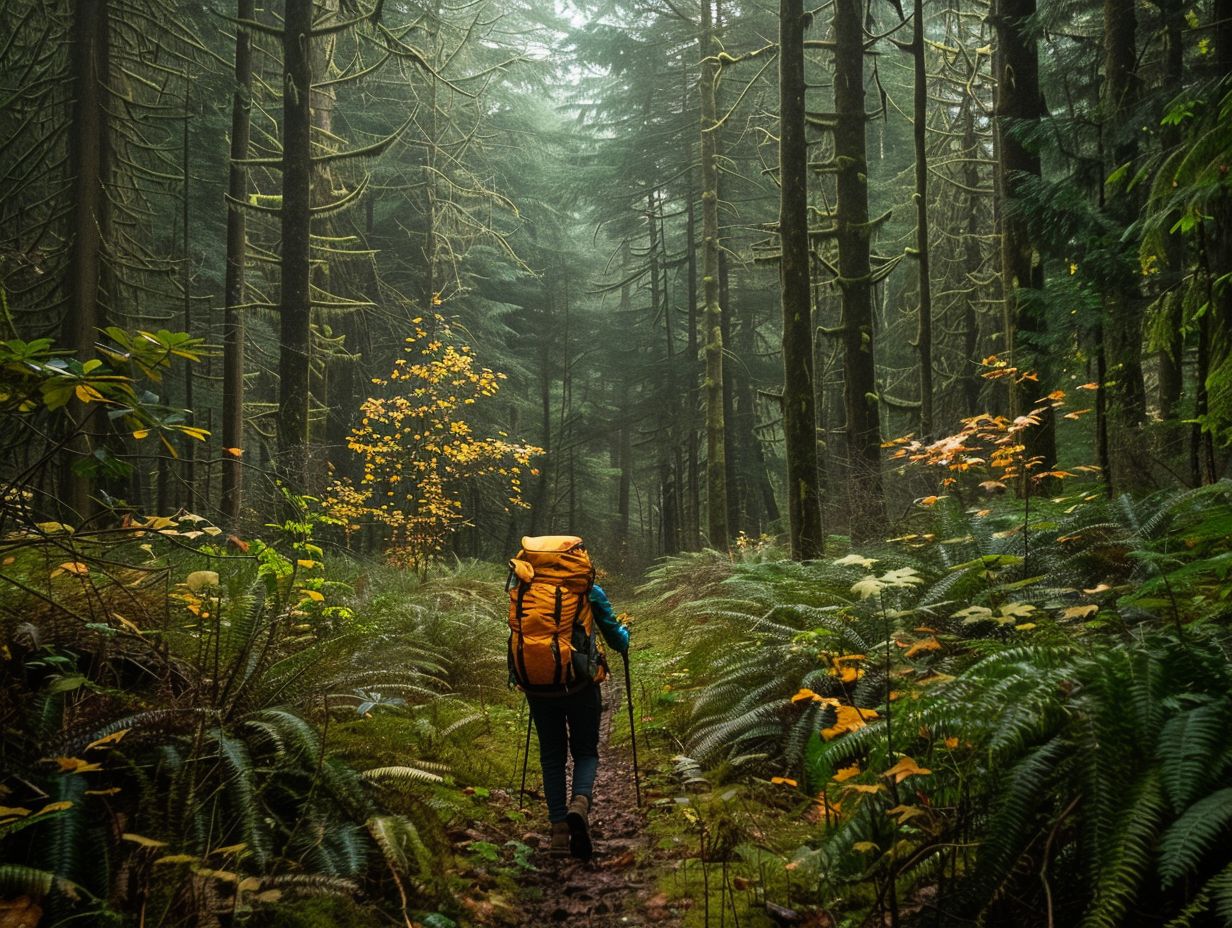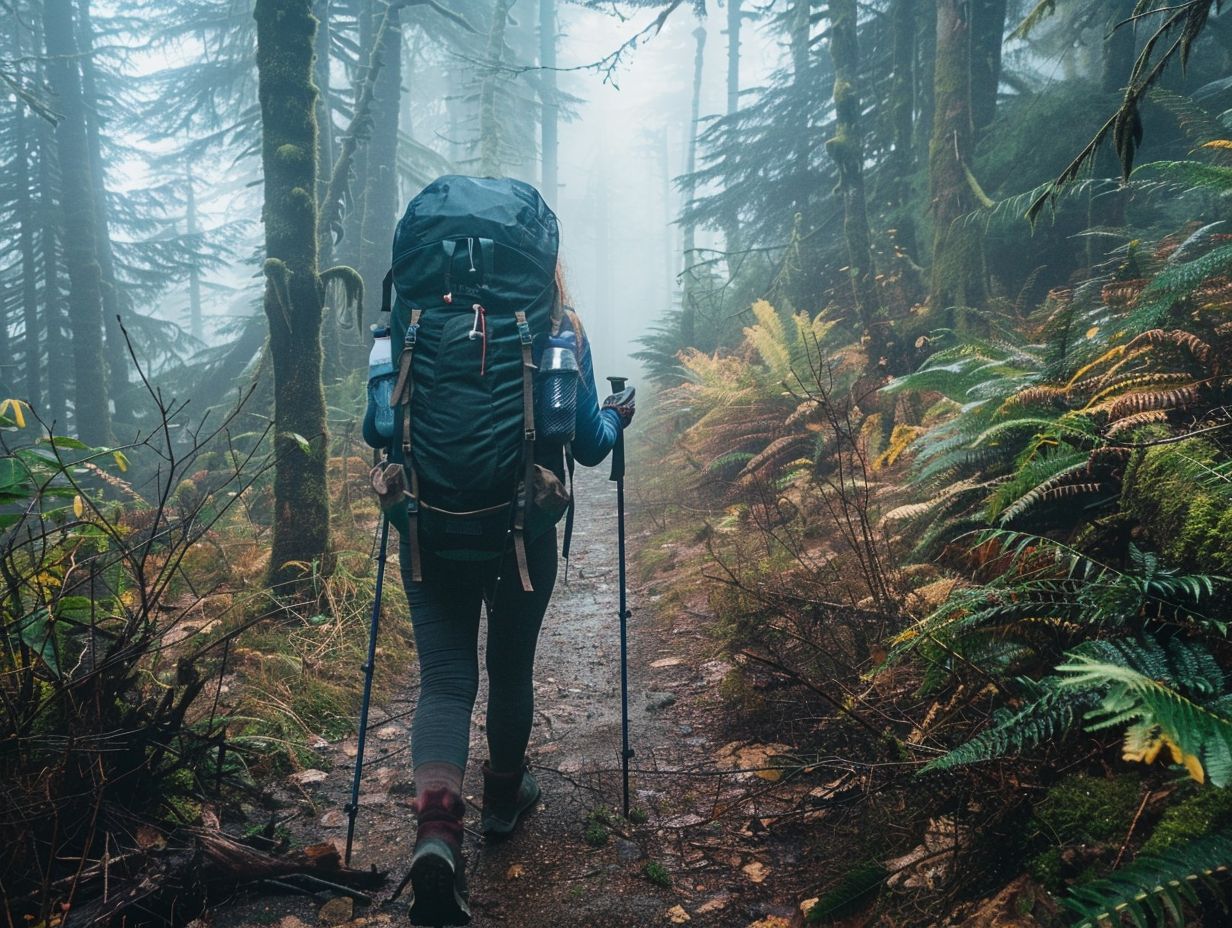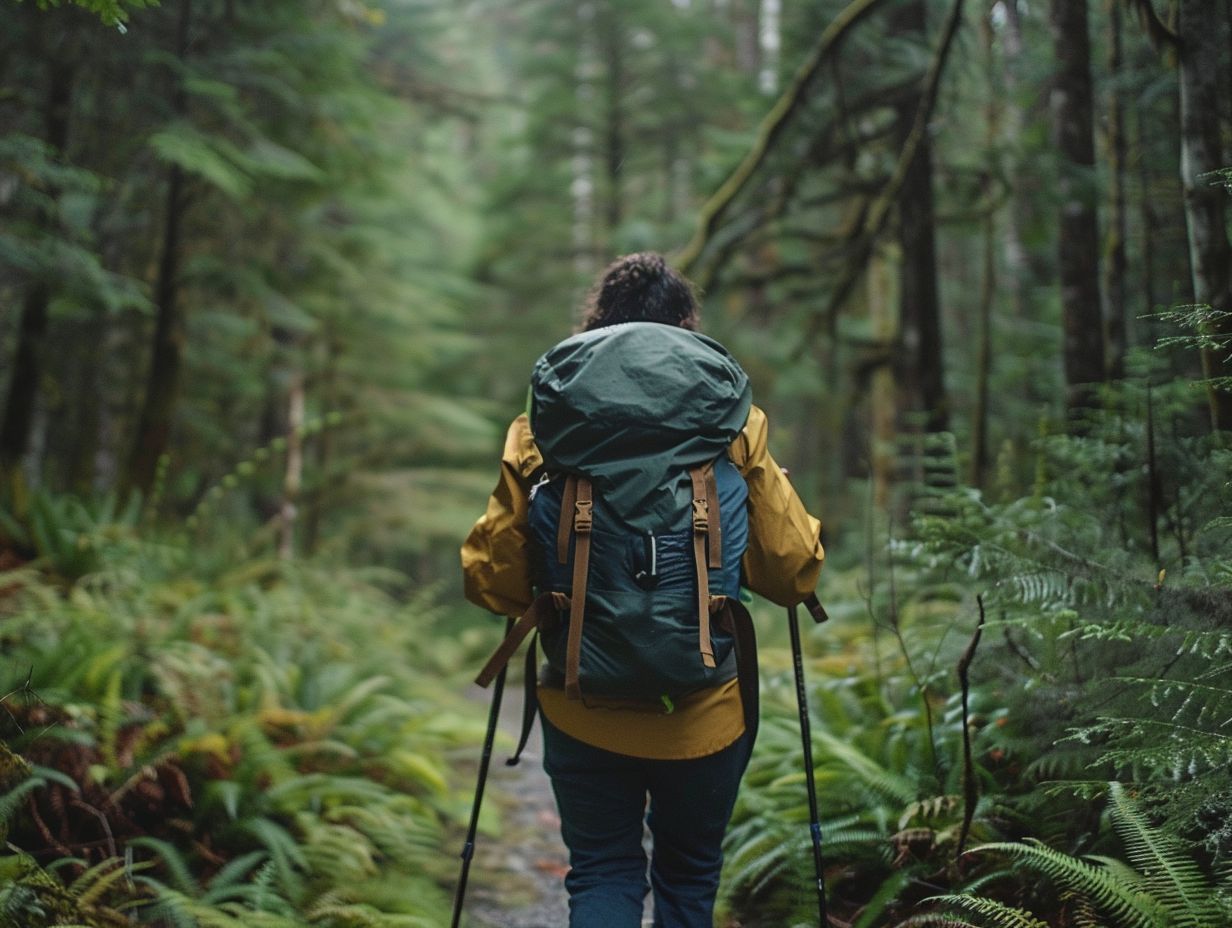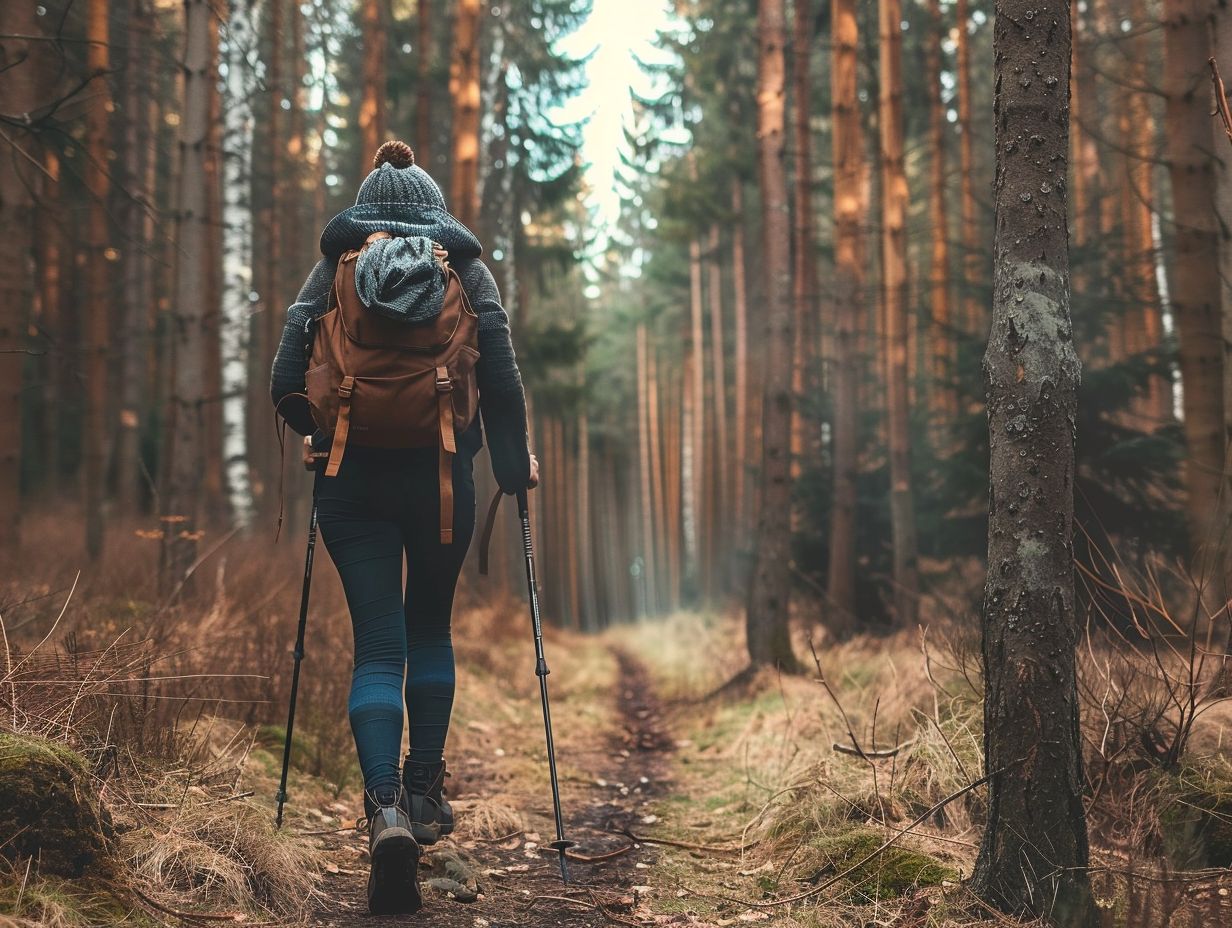If you are an outdoor enthusiast looking to maximise your camping and hiking experience, maintaining fitness is essential. This article delves into the significance of staying fit while camping and hiking, providing insights on preparing through training and conditioning tips, as well as staying active during your excursion with exercises and activities. Additionally, it covers nutrition tips, the importance of rest and recovery, and maintaining healthy habits post-trip.
Prepare to enhance your outdoor experience and make the most of your adventures in the great outdoors.
Key Takeaways:

- Stay fit while camping and hiking for better overall performance and enjoyment on outdoor adventures.
- Prepare physically for camping and hiking by incorporating training and conditioning into your routine.
- Stay active during your trip by incorporating exercises and activities, and maintain a balanced diet for optimal performance.
The Importance of Staying Fit While Camping and Hiking
Engaging in fitness routines whilst camping or hiking can enhance your overall experience and ensure that you maintain your physical well-being amidst nature’s beauty.
Regular physical activity during these outdoor activities helps strengthen your muscles, improve endurance, and boost cardiovascular health. The combination of fresh air, challenging terrain, and physical movement can contribute to stress reduction and mental clarity.
Exploring trails and setting up camp require physical exertion, leading to a deep sense of accomplishment and fulfilment. By integrating exercise into your outdoor excursions, you not only enhance your fitness levels but also foster a deep connection with nature and promote holistic well-being.
Remember that staying active during camping or hiking is not just about enjoying recreational activities but also about taking care of your health and immersing yourself in the natural environment to the fullest.
Benefits of Maintaining Fitness on Outdoor Adventures
Maintaining fitness on outdoor adventures such as hiking and camping can offer you a wide range of benefits. These include improvements in cardiovascular health, increased endurance, and a stronger immune system.
Engaging in regular workouts in outdoor settings not only helps in enhancing your physical fitness but also plays a significant role in your mental well-being by reducing stress levels and elevating your mood.
Participating in outdoor activities like trail running, rock climbing, or kayaking can be instrumental in elevating your overall fitness levels. It also provides a refreshing change in scenery from the typical indoor workout environments.
The combination of fresh air, natural surroundings, and physical exertion can bring about a sense of achievement and satisfaction, ultimately leading to better sleep quality and increased energy levels throughout the day.
Additionally, taking part in group fitness challenges or outdoor obstacle courses can foster a sense of camaraderie and teamwork, enriching your overall exercise experience.
Preparing for a Camping and Hiking Trip
Preparing for a camping and hiking trip involves more than just packing gear; it also includes conditioning your body for the physical demands of the journey ahead. You should focus on exercises that strengthen your legs, such as squats, lunges, and calf raises, as these will help you tackle inclines and uneven terrain with greater ease.
Working on your core strength with planks and Russian twists will provide stability and balance on the trail. Enhancing your cardiovascular endurance through activities like running, cycling, or brisk walking will prepare you for sustained periods of activity.
Selecting appropriate footwear, clothing, and rucksacks is crucial for comfort and support during long hikes. By integrating these training methods and gear selections, you can optimise your physical readiness for the adventure ahead.
Training and Conditioning Tips
When preparing for camping and hiking trips, it is important to optimise your performance. A well-rounded fitness routine should include cardiovascular exercises like running and hiking, strength training using weights, and flexibility workouts such as stretching.
By prioritising these exercises, you can enhance your endurance and overall physical fitness levels for outdoor adventures.
Plus these foundational exercises, interval training can be particularly advantageous in boosting stamina specifically for camping and hiking excursions.
This type of training involves alternating between high-intensity activities and periods of rest or lower-intensity movements, effectively challenging your cardiovascular system and preparing it for the demands of the outdoors.
Supplementing your routine with bodyweight exercises like press-ups, squats, and lunges can further strengthen key muscles needed for carrying gear and navigating rough terrains. Additionally, incorporating balance exercises like yoga poses or stability drills can improve core stability and reduce the risk of injuries while trekking on challenging trails.
Staying Active During the Trip

Maintaining your fitness levels and fully embracing the outdoor experience during a camping or hiking trip requires you to stay active. By incorporating activities such as TRX workouts, yoga sessions, and brisk walks into your routine, you can ensure that you remain energised, flexible, and strong throughout your journey.
Participating in these activities offers more than just physical benefits; it also provides an opportunity to form a deeper connection with nature. As you engage in yoga poses surrounded by breathtaking landscapes or challenge yourself with TRX exercises in the open air, you are not just exercising; you are immersing yourself in the splendour of the natural world.
Integrating functional movements like squats or lunges into your regimen can help you enhance your strength while appreciating the scenic views surrounding your campsite.
Exercises and Activities to Incorporate
When incorporating a variety of exercises and activities during camping and hiking trips, you can enhance your outdoor experience. Consider integrating swimming in natural bodies of water, utilising resistance bands for strength training, engaging in skipping rope for cardio, cycling through scenic trails, and participating in high-intensity interval training (HIIT) sessions to diversify your fitness routine.
When camping or hiking, taking a refreshing swim in a nearby lake or river not only provides a great workout but also rejuvenates your senses. Resistance band workouts offer versatile options for targeting different muscle groups in the absence of traditional gym equipment.
Skipping rope is a fun way to elevate your heart rate and enhance agility while appreciating the natural surroundings. Cycling through the wilderness not only strengthens your lower body muscles but also enables you to explore more remote areas.
HIIT sessions, with bursts of intense exercise followed by short rests, help maximise calorie burn in a short amount of time amidst nature’s beauty.
Eating Well on the Trail
Maintaining proper nutrition while camping or hiking is crucial for sustaining energy levels, supporting muscle recovery, and optimising performance during outdoor activities.
When you are out on the trail, it is important to focus on high-energy, lightweight foods that are easy to pack and won’t spoil quickly. You should opt for whole foods like nuts, seeds, fruits, and jerky to ensure a balance of carbohydrates, protein, and healthy fats.
Planning nutritious meals and snacks in advance is essential to provide the essential nutrients and hydration needed to fuel your adventures.
By preparing meals ahead of time and portioning them out, you can save time and ensure you have the right fuel when you need it most. Hydration is a key aspect to consider, so make sure to pack plenty of water and electrolyte-rich beverages to stay hydrated while in the outdoors.
Snacking on energy bars, trail mix, or dried fruits can also help maintain energy levels throughout the day. Prioritizing proper nutrition and hydration while camping or hiking will help you perform at your best and make the most of your outdoor experiences.
Nutrition Tips for Outdoor Adventures
When you embark on outdoor adventures such as backpacking and hiking in places like Thailand, Bali, or Malaysia, nutrition becomes a critical factor in maintaining energy levels and facilitating recovery.
To optimise your performance and enjoyment during these journeys, it is imperative that you pack nutrient-dense foods, prioritise hydration, and ensure a balance of macronutrients.
For sustenance on the trails, it is advisable to select lightweight, non-perishable items like nuts, seeds, dried fruits, and energy bars.
These options offer a quick and convenient source of fuel without the need for refrigeration. Additionally, preparing dehydrated meals or crafting your own trail mixes can provide nourishing alternatives that are resistant to spoilage.
Given the challenges of tropical climates, proper hydration is paramount. Carrying a reusable water bottle or a hydration pack is essential to ensure adequate fluid intake. Opting for water-rich fruits such as watermelon, cucumber, or oranges can aid in hydration while also serving as a refreshing snack.
Maintaining a harmonious blend of carbohydrates, proteins, and healthy fats is crucial to supporting your fitness objectives and bolstering endurance levels during extended hikes or treks through exotic landscapes. By focusing on nutrition and hydration strategies, you can enhance your outdoor experience and optimise your performance in challenging environments.
Recovery and Rest on the Trail
Prioritising recovery and rest while camping or hiking is crucial for muscle repair, injury prevention, and overall well-being during outdoor excursions. Adequate rest allows your body to recover from physical exertion and readies you for the challenges of the next day, ensuring that you can fully savour the journey.
Quality sleep is a key component of the body’s recovery process. Establishing a comfortable sleeping environment with appropriate bedding and insulation can facilitate restful sleep. Incorporating stretching exercises and foam rolling before bedtime can help alleviate muscle tightness and promote relaxation.
Adequate hydration and nutrition also play a significant role in effective recovery; maintaining hydration levels and consuming nutrient-dense foods replenishes energy and supports muscle repair. By incorporating these rest and recovery techniques, you can enhance your camping or hiking experience and optimise your physical well-being.
Importance of Rest and Recovery for Optimal Performance

Rest and recovery are vital components of optimising performance and preventing burnout during physical activities like running, gym workouts, or following fitness programs by trainers such as Joe Wicks. Utilising tools such as Fitbit or Amazon resources can assist you in monitoring sleep quality and recovery metrics to customise rest strategies to meet your individual needs.
Sleep plays a significant role in the recovery process, enabling your body to repair and replenish after exertion. Quality rest is imperative for muscle growth and overall well-being. Plus adequate sleep, integrating active recovery practices like stretching, foam rolling, or yoga can enhance flexibility and reduce muscle soreness.
Technological tools like Fitbit or Amazon devices provide insights into heart rate variability, sleep cycles, and activity levels, enableing you to make informed decisions about your restorative processes for enhanced performance outcomes.
Maintaining Fitness After the Trip
Maintaining fitness levels post-camping or hiking trip is crucial for continuing to enjoy the advantages of physical activity and outdoor excursions. It is recommended that you engage in regular fitness routines, gym sessions, or stretching exercises to preserve muscle strength, flexibility, and cardiovascular health upon your return from the trip.
To smoothly transition back to your daily routine after your adventure, it is advisable to incorporate brisk walks or jogs into your everyday schedule.
Additionally, incorporating bodyweight exercises such as squats, press-ups, and planks can assist you in staying strong and active. Setting specific workout objectives and establishing a consistent exercise timetable can offer organisation and motivation for your fitness journey.
Remember to prioritise proper hydration and nutrition to aid in your body’s recovery and overall well-being post-trip. Maintaining consistency and incorporating a variety of exercises will help prevent monotony and keep you invested in your fitness regimen.
Continuing Healthy Habits Post-Trip
To maintain your overall fitness levels after your camping or hiking trip, it is important to incorporate a variety of workouts such as weight training, yoga sessions, and resistance band exercises. Utilising specialised fitness guides like the Bridal Body Workout Guide by Stephanie Thomas can offer structured routines to assist you in achieving your ongoing health goals.
Incorporating activities like cycling, swimming, or high-intensity interval training (HIIT) can help keep your body challenged and prevent hitting a plateau. Engaging in group fitness classes such as Zumba or kickboxing can introduce diversity and motivation into your exercise regimen.
Prioritising flexibility and mobility through activities like Pilates or stretching routines can enhance your range of motion and reduce the risk of injuries. By diversifying your workouts and including targeted exercises, you can ensure a comprehensive approach to maintaining fitness levels post-outdoor adventures.
Frequently Asked Questions
Can I stay fit while camping and hiking?
Yes, absolutely! Camping and hiking are great ways to stay fit and active while also enjoying the great outdoors.
How can I incorporate exercise into my camping and hiking trip?

There are many ways to incorporate exercise into your trip. You can go for a hike or a run, do bodyweight exercises at your campsite, or even take a swim in a nearby lake or river.
What are some easy exercises to do while camping and hiking?
Some easy and effective exercises to do while camping and hiking include squats, lunges, push-ups, and planks. You can also try activities like yoga, cycling, or even playing a game of frisbee.
How can I stay hydrated while staying fit on my trip?
Staying hydrated is crucial for staying fit while camping and hiking. Make sure to bring plenty of water and replenish regularly. You can also snack on fruits and vegetables with high water content, such as watermelon and cucumber.
What are some healthy food options to pack for my camping and hiking trip?
Some healthy food options to pack include nuts, dried fruits, energy bars, and dehydrated meals. You can also bring fresh fruits and vegetables and cook them over a campfire for a nutritious and delicious meal.
How can I prevent injuries while staying fit on my trip?
To prevent injuries, make sure to warm up before any physical activity. Also, be mindful of your surroundings and wear appropriate footwear and clothing. Take breaks when needed and listen to your body. If you do experience any pain or discomfort, stop and rest.



